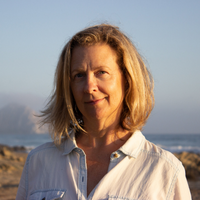It can be easy to think of transforming your life as something that you do or something that happens to you. In fact, a more helpful way to think about it is to see it as regenerative agriculture.
You might think that what you really need to do is to get rid of the unpleasant, unhelpful, or even painful parts of yourself.
Maybe the answer is to get rid of the negative people around you. This makes sense because when life feels stressful, fearful, or painful, your brain is designed to look outside of you, identify the problem, and fix it.
This way of thinking is how we approach nearly everything in life. And it’s a reflection of what we have come to understand as conventional agriculture.
In what we all think of as normal food production, other plants and bugs are seen as enemies. So, the strategies are to attack and destroy them. And just like human-to-human warfare, there is always what is commonly described as collateral damage. That’s an aloof way of saying we kill beings that we didn’t set out to. Because they are threats to our goals, we don’t recognize them as beings entitled to live.
When these dominator strategies cause damage to the soil by killing all life and draining its vitality, manufactured chemicals must be added to attempt to mimic what was there before. This never actually works. The soil continues to be degraded every time this process of ‘kill and fill’ is applied. When this process isn’t stopped the soil becomes dirt, a gritty substance that doesn’t nourish life.
This is a metaphor for our relationship to our inner landscape.
You don’t like a part of yourself? Spray it with weed killer or engineer it out of existence.
You don’t like the pests bothering you? Remove them from your life.
It’s Just The Way It Is
You might be thinking, ‘hey, that’s just the way it is.’ This is normal because culturally, domination of ourselves and our natural world has been normalized.
It’s probably easy for you to recognize domination when a country goes to war or when police brutalize their citizens. What may be more evasive is recognizing how often and when you do it to yourself.
This doesn’t mean that you’re not a good person. Being conditioned to dominate your more vulnerable aspects is something you were taught; it’s not who you are. And, you will have gotten a lot of social validation for it, especially in those tender, formative years.
You don’t even have to have been abused by toxic parents to have been conditioned to be dominating toward yourself. This mindset doesn’t have to have been planted in extreme circumstances to have taken root. Even seemingly simple thoughts will do, like:
‘There’s nothing to cry about.’
‘You’re so sensitive, what’s wrong with you?’
‘You always get this way.’
Every time you turned your vulnerable self away in order to be acceptable to those your very existence depended upon, you used power over yourself. And sometimes it worked really well. You were acceptable. Until the next time you had a sensory, emotional, or mental experience for which you needed support but were left on your own.
All this to say, you learned how to use the weed killer and bug spray to eliminate the parts of you that others couldn’t or didn’t give unconditional love to. And, because you’re smart, you found synthetic substitutes to keep your inner soil from becoming totally lifeless.
Your Biological Clock
Today, your soil has become too much like dirt. How you know this is true is showing up in a number of ways.
Your body says, “I can’t keep this up” through
- chronic conditions
- poor sleep
- an inability to choose enough nourishment
- a lack of willingness to make taking care of yourself your number one priority
- anxiousness
- sadness
These are all signs that your soil is teetering on the edge of becoming dirt. It becomes harder and harder to ignore as we age, although it can happen at any phase of life.
The Cure
There is a cure. It’s learning how to tend your inner soil. You’ll find it in discovering how the other plants and bugs are partners in your blossoming. You’ll be a powerful tender of your inner soil. Once you reclaim the vitality of your inner landscape, nourishment abounds.

Sure, you’ll get your hands dirty and sometimes you’ll be a bit sore from the work. Fortunately, every inch of ground you attend to delivers rewards that right now are beyond what you can imagine.
I believe in you because I already see the lush, diverse, rich garden that is your true self. And, I’ve been tending my own inner landscape for a long time so I am confident that I can guide you in reaching your destiny.
You’re destined to let your brilliance and beauty shine into the world and I’m here to help you do just that. Start now by enrolling in the Emotional Mastery Journey group coaching program. I’ll see you there!